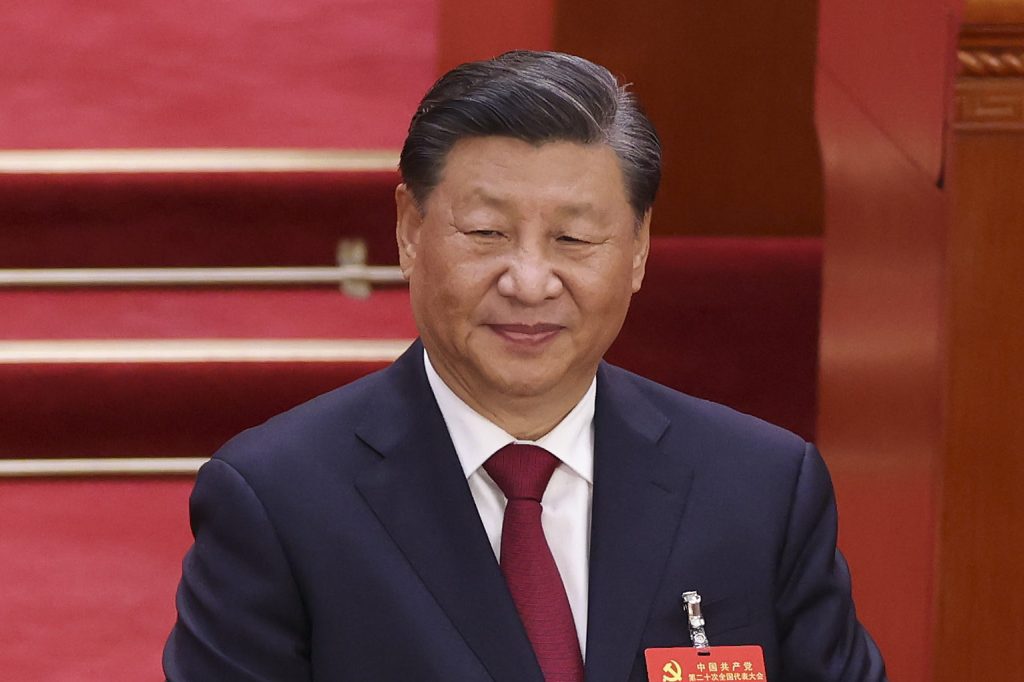Biden knows that the world has changed
Yesterday, while Joe Biden was picking up some competitively priced work outfits at a strip mall in Delaware (more on that later), Xi Jinping took to the stage in Beijing to deliver the opening address of the Chinese Communist Party conclave at which he is set to extend his rule into a second decade.
Over more than two hours, Xi set out an uncompromising, nationalistic path for China’s future. The longest applause came as he took a hard line on Taiwan: “The wheels of history are rolling on toward China’s reunification and the rejuvenation of the Chinese nation. Complete reunification of our country must be realized, and it can, without doubt, be realized.”
More generally, Xi struck an ominous tone on foreign policy: “Be mindful of dangers in the midst of peace,” he said. “Get the house in good repair before rain comes, and prepare to undergo the major tests of high winds and waves, and even perilous, stormy seas.”
Xi’s coronation comes a few days after the publication of the Biden administration’s National Security Strategy. Like Xi’s speech, the document is confirmation of a fast-changing and dangerous world. Delayed by a year because of the Russian invasion of Ukraine, the strategy acknowledges that “we are now in the early years of a decisive decade for America and the world” and argues that “the post-Cold War era is definitely over and a competition is underway between the major powers to shape what comes next.”
When a long treatise emerges from officialdom, the challenge is to distinguish the indicators of a substantive change in strategy from the throat-clearing and rhetorical nods to the pet projects and hang-ups of assorted factions and interest groups. But even by the standards of such documents, the strategy is disconcertingly heavy on rhetorical flourishes about climate change and needless nods to the administration’s domestic economic agenda.
But on the big geopolitical questions, the administration is explicit, sketching a daunting dual threat from Russia and China. The paper warns of “powers that layer authoritarian governance with a revisionist foreign policy” whose behavior “poses a challenge to international peace and stability.”
These threats differ in nature though. As the document explains, Russia “poses an immediate threat to the free and open international system,” whereas China “is the only country with both the intent to reshape the international order and, increasingly, the economic, diplomatic, military and technological power to advance that objective.”
Slowly, the suspiciously neat framing of democracy versus autocracy set out by Biden early on is giving way to a more realistic picture of the world. That is a welcome development, as is the clarity with which Biden and his advisors are willing to talk about the threats to peace and security. But that honesty is as unsettling as it is refreshing. Not least because of the one thing missing from the strategy: a government response commensurate with the threat it describes.
Given the chance to tout the ways in which they are responding to geopolitical threats, the administration offers platitudes about democracy and military modernization. The absence of anything more concrete is maddening. America has been slow to see its foes for who they are. Today their true nature is clear and there is a reassuring bipartisan consensus on the nature of challenge. Now to rise to it.
*** Sign up to receive the DC Diary in your inbox here ***
The red wave regains momentum
Bad news for Democrats comes in the form of a New York Times/Siena College poll this morning. The survey gives Republicans a four-point lead on the generic congressional ballot, on 49 percent to the Democrats’ 45 percent. In the same poll last month, the Democrats had a two-point lead.
Closer inspection of the poll is no more reassuring for the president’s party than the headline numbers. Contra Democratic hopes of the energizing impact of the Dobbs decision, the parties are tied among women voters. According to the poll, independent women have swung sharply rightwards in the last month. In September, they favored Democrats by fourteen points; Republicans now lead by eighteen points among this group.
Perhaps most importantly, the economy and inflation are, by a clear margin, the issues that matter most to voters. Asked what they think the most important problem facing the country is today, 26 percent of likely voters say the economy and 18 percent say inflation or the cost of living. The next largest problem, the state of democracy, registers just 8 percent. The percentage who think abortion is the top issue? Just 5 percent.
Biden: ‘Get in loser, we’re going shopping’
Aviators, vanilla ice cream, PB&J sandwiches: Joe Biden has a proven penchant for the inoffensive. And so it is with menswear. The president made an unscheduled stop after church in Delaware yesterday, picking up supplies at a Jos A. Bank. Per the White House pool, Biden “emerged from Jos. A. Bank at 11.24 a.m. carrying one large bag of unknown contents. He walked directly to the Beast without taking questions.”
Barack vs the buzzkills
With all the indicators pointing towards a tough slate of midterm results for Democrats, Barack Obama has some advice for his party. Sometimes Democrats can be buzzkills, he said in an appearance on Pod Save America, a show hosted by his former staffers. “Sometimes people just want to not feel as if they are walking on eggshells and they want some acknowledgement that life is messy and that all of us at any given moment can say things the wrong way, make mistakes.”
What you should be reading today
John Pietro: The right’s dangerous embrace of soft isolationism
Mike Adams: Why our cannabis experiment failed
Emmet Penney: Nuclear power is the answer to our energy woes
Natalie Allison, Politico: The sleeper state Republicans are targeting to win the Senate
Robyn Dixon and Natalia Abbakumova, Washington Post: Russia is taking men off the street to fight in Ukraine
Jonathan Weisman, New York Times: New generation of combat vets strike from the right
Poll watch
President Biden job approval
Approve: 43.6 percent
Disapprove: 53.3 percent
Net approval: -9.7 (RCP average)
New York governor’s race
Kathy Hochul (D): 50 percent
Lee Zeldin (R): 44 percent (Schoen Copperman)


















